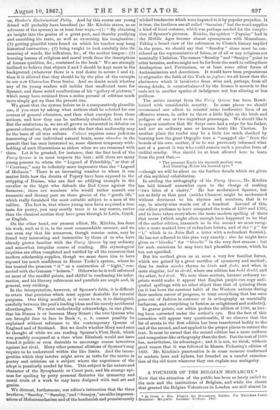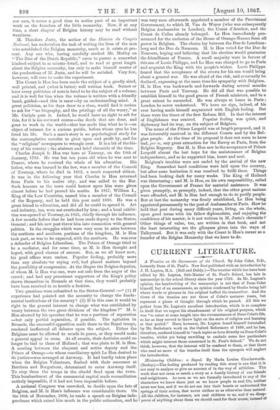A FOUNDER OF THE BELGIAN MONARCHY.• Now that the attention
of the public has been so lately called to the men and the institutions of Belgium, and while the cheers that greeted the Belgian Volunteers in London are still almost in
• Le Comte le Hon. D'apres des Dieument■ Inddits. Par Theodore Juin. Bruxelles: Mariann. Loadres: Trdbuer. 1867.
our ears, it seems a good time to notice part of an important work on the founders of the little monarchy. Now, if at any time, a short chapter of Belgian history may be read without weariness.
M. Theodore Juste, the author of the Ilistoire du Congres National, has undertaken the task of writing the lives of the men
who established the Belgian monarchy, much as it exists at pre- sent. Any one who, having carefully studied Mr. Motley on "The Rise of the Dutch Republic," cares to pursue a somewhat kindred subject in as minute detail, and to read at great length about the Belgian monarchy, has only to make himself master of the productions of M. Juste, and be will be satisfied. Very few, however, will care to make the experiment.
The Count le Hon has been made the subject of a goodly sized, well printed, and (what is better) well written book. Sooner or later every politician of note is fated to be the subject of a volume; and it is well for him when the volume is written with a friendly hand, guided—and this is rarer—by an understanding mind. A great politician, as his days draw to a close, would find it useless to ask for " no biography, and the privilege of all the weary," as Mr. Carlyle puts it. Indeed, he would have no right to ask for
this, for it is his outward course—the deeds that are done, and gone to work in the world—that has made him what he is—an object of interest for a curious public, before whose eyes he has lived his life. Such a man's story is no psychological study for the contemplative novelist to gloat upon and profit by, and for the " religious" newspapers to wrangle over. It is a bit of the his- tory of his country ; the abstract and brief chronicle of the time. Charles Joseph le Hon was born at Tournay, on the 10th of January, 1792. He was but ten years old when he was sent to
France, where he received the whole of his education. His father, who was learned in the law, was a member of the Council of Tournay, where he died in 1812, a much respected citizen. It was in the following year that Charles le Hon returned from Paris to his native city, and was called to the Bar. Such honours as the town could bestow upon him were given almost before he had proved his merits. In 1817, William I., King of the Low Countries, named him a member of the Council of the Regency, and he held this post until 1830. He was a great friend to education, and did all he could to spread it. Art and industry, too, were not overlooked by him ; and a local exhibi- tion was opened at Tournay, in 1825, chiefly through his influence. A few months before that he had been made deputy to the States- General ; and his new post threw him into connection with general politics. In the struggles which were very soon to arise between the northern and southern portions of the kingdom, M. le Hon took part, as was to be expected, with the southern. He was ever a defender of Belgian Liberalism. The Prince of Orange tried to be a mediator, and for some time, as M. le Hon thought and hoped, with good chance of success. But, as we all know now, his good offices were useless. Popular feeling, probably more than any absolute •or crying evil, had placed matters beyond the possibility of compromise. At the Hague the Belgian deputies, of whom M. le Hon was one, were not safe from the anger of the crowd ; and had any prominent supporters of the King's policy shown themselves in Brussels at that time, they would probably have been received in as hostile a fashion.
Two questions were submitted to the States-General :—" (1) If experience had pointed out the necessity to change the funda- mental institutions of the country? (2) If in this case it would be right in the general interest to change what was established by treaty between the two great divisions of the kingdom ?" M. le Hon showed by his speeches that he was a partizan of separation —but only partial separation, if possible. The agitation in Brussels, the successful opposition made there to the Royal troops, rendered ineffectual all debates upon the subject. Either the Belgians must be allowed to secede in peace, or they would make a general appeal to arms. At all events, their destinies could no longer be tied to those of Holland ; that was plain to M. le Hon. A meeting between the eloquent and active deputy and the Prince of Orange—to whose conciliatory spirit Le Hon desired to do justice—was arranged at Antwerp. It had hardly taken place when the Belgian Volunteers, flushed with their successes at Berchem and Borgerhout, determined to enter Antwerp itself. To stop them the troops in the citadel fired upon the town. This bombardment of the commercial capital made reconciliation entirely impossible, if it had not been impossible before.
A national Congress was convoked, to decide upon the fate of Belgium, and M. le Hon's influence was considerable there. On the 18th of November, 1830, he made a speech on Belgian inde- pendence which raised him much in the public estimation, and he was very soon afterwards appointed a member of the Provisional Government, to which M. Van de Weyer (who was subsequently Belgian Ambassador in London), the Count d'Arschot, and the Count de Celles already belonged. Le Hon immediately pro- nounced for the exclusion of the House of Orange-Nassau from all power in Belgium. The choice lay between the Due de Leuchten- berg and the Due de Nemours. M. le Hon voted for the Due de Nemours, hoping and believing that his election would guarantee the friendliness of France. A small majority were in favour of this son of Louis Philippe, and Le Hon was charged to go to Paris and acquaint the King with the people's wishes. Louis Philippe feared that the acceptance of the crown for his son would bring about a general war. He was afraid of the risk, and eventually he declined, expressing at the same time his sympathy with Belgium. M. le Hon was backwards and forwards during several months between Paris and Tournay. He did all that was possible to establish himself in the good graces of French ministers, and to a great extent he succeeded. He was always at home in Paris ; London he never understood. We have no sign, indeed, of his ever having made himself acquainted with English feeling. But those were the times of the first Reform Bill. In that the interest of Englishmen was centred. Popular feeling was quiet, and diplomacy had its way, on the subject of Belgium.
The name of the Prince Leopold was at length proposed, and it was favourably received in the different Courts and by the Bel- gian people. At the time of its proposal it does not seem to have had, per se, any great attraction for the Envoy at Paris, from the Belgian Regency. But M. le Hon saw in the acceptance of Prince Leopold almost the last hope for the maintenance of Belgian independence, and so he supported him, heart and soul.
Belgium's troubles were not ended by the arrival of the new King. Somewhat hard conditions were laid upon the country, but after some hesitation it was resolved to fulfil them. Things had been looking dark for many weeks. The King of Holland was threatening ; and M. le Hon, on his own responsibility, called upon the Government of France for material assistance. It was given promptly, so promptly, indeed, that the other great nations, were offended, and M. le Hon had enough to do to pacify people. But at last the monarchy was firmly established, Le Hon being appointed permanently to the post of Ambassador at Paris. How he held that post during many difficult years, living, on the whole, upon good terms with his fellow diplomatists, and enjoying the confidence of his master, is it not written in M. Jute's chronicle ? Other things of value, too, are written in that book, and not the least interesting are the glimpses given into the ways of Talleyrand. But it was only with the Count le Hon's career as a founder of the Belgian Monarchy that we have to do.































 Previous page
Previous page